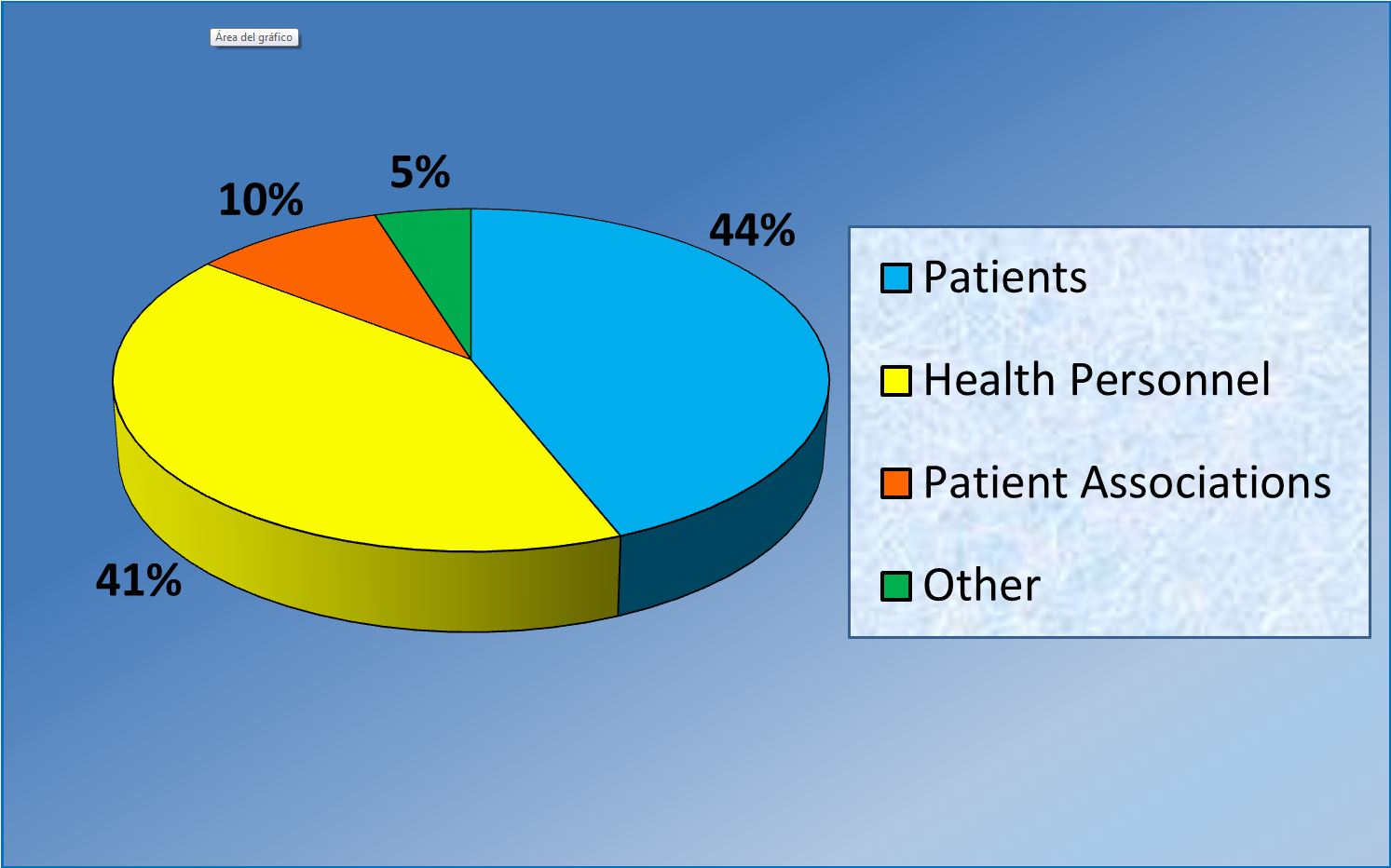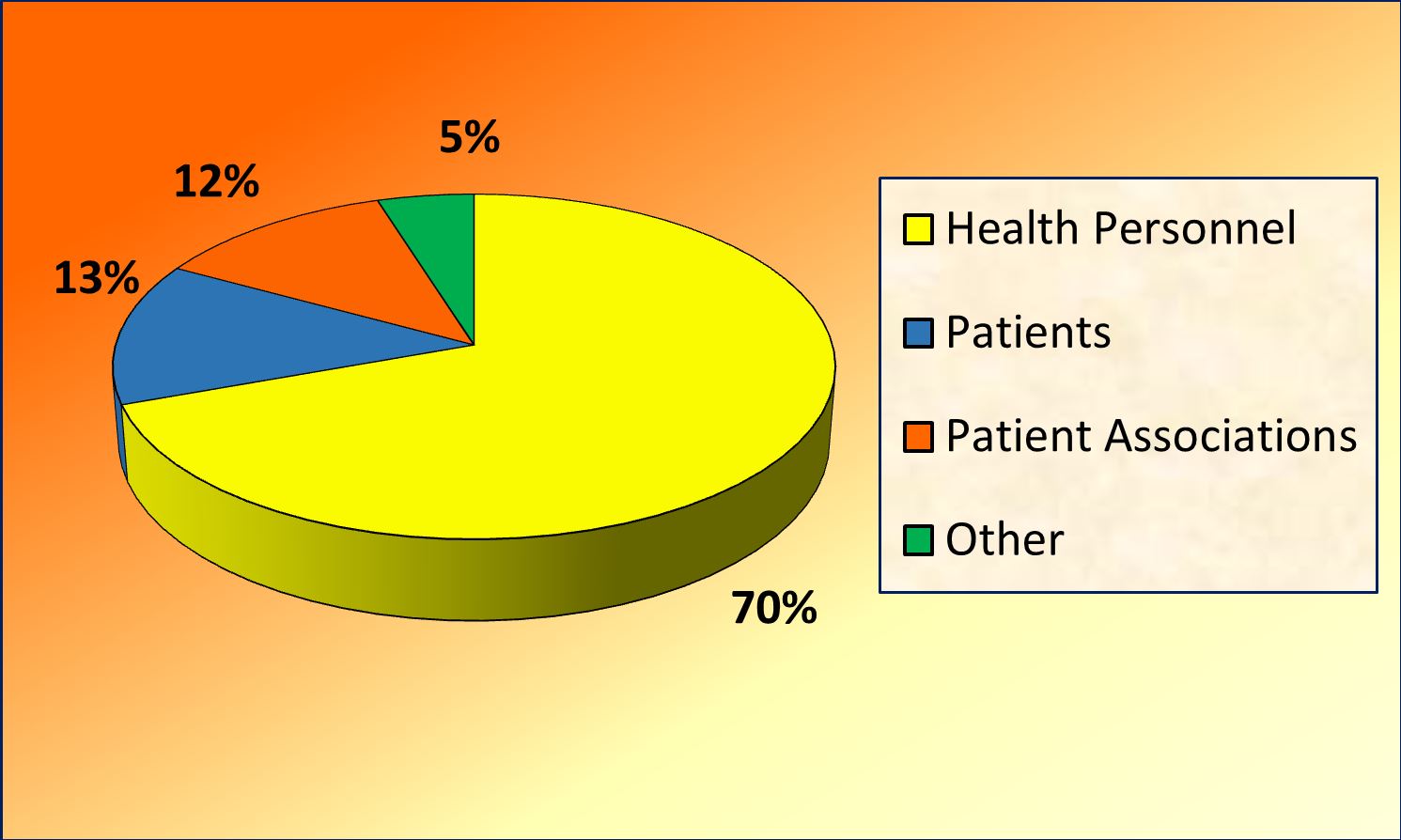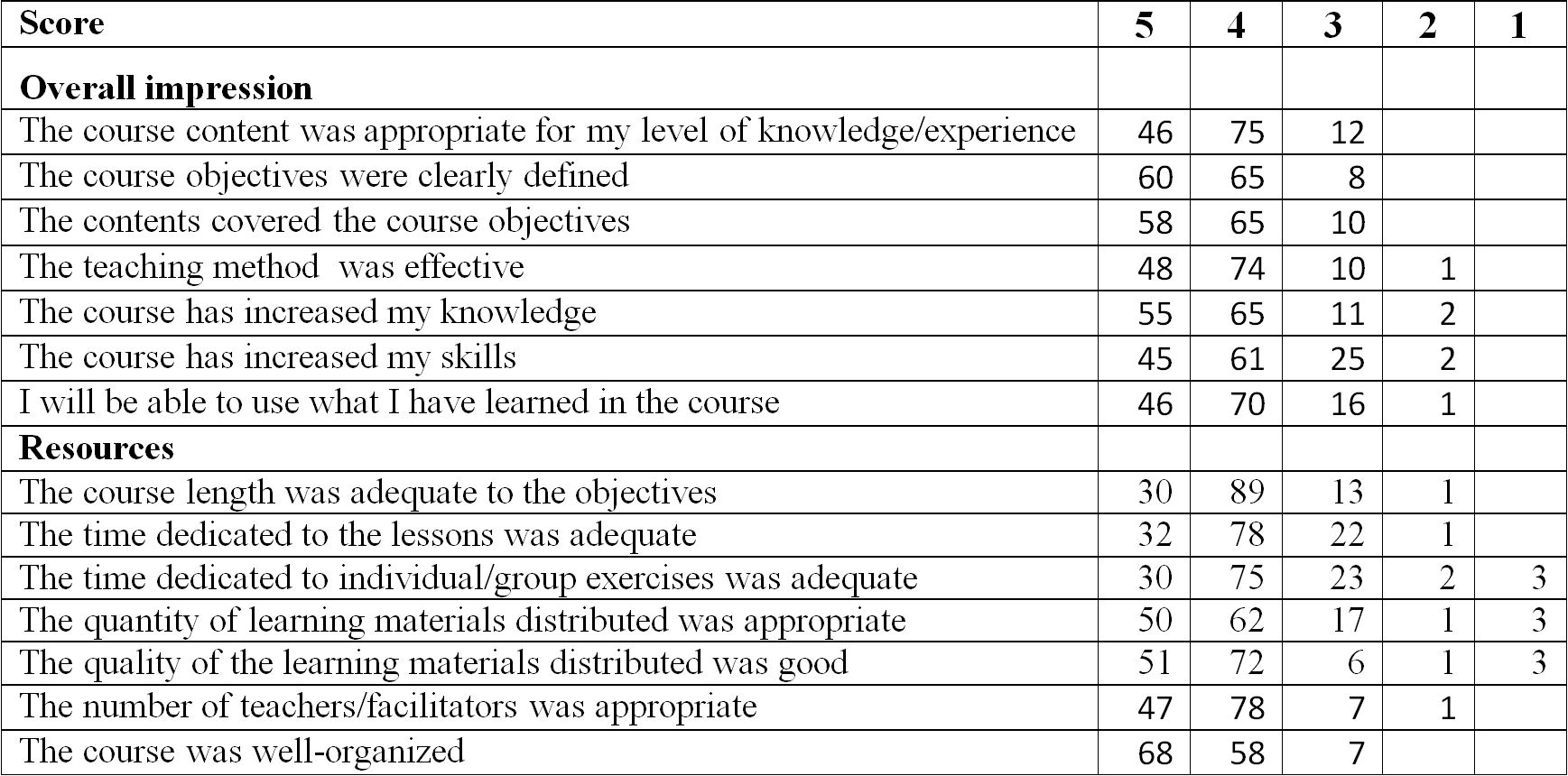Maurella DELLA SETA1, Rosaria Rosanna CAMMARANO1, Paola FERRARI1, Tania LOPEZ2, Scilla PIZZARELLI1, Letizia SAMPAOLO1, Antonio SETTE1, Corrado DI BENEDETTO1
1 Istituto Superiore di Sanità, Rome, Italy
2 Clinical Medicine Department, Sapienza Università di Roma, Rome, Italy
maurella.dellaseta@iss.it
Keywords: Patient Participation, Health Literacy, Patient Education as Topic, Internet, Italy
Introduction
The aim of this paper is to report the updated results of the project ‘Health Literacy and Patient Empowerment through the development of an e-Health Information System’, The project (2012-2016) was funded by the Italian Ministry of Health with a grant of €258,500 (GR‐2010‐2313824), and lead by the Istituto Superiore di Sanità (ISS). It had the following objectives:
- Increasing health literacy level and patient empowerment in several areas of our country.
- Improving physician-patient interaction.
- Collecting and organizing the large amount of health information available from quality-evaluated Internet sources — meeting the HONcode requirements (1) — within the Italian National Health Service, scientific societies, patient associations.
- Developing a web Portal (MEDUSA – Medicina Utenti Salute in rete), as an Italian reference point to grant easy access to patient-tailored comprehensive medical information, inspired by US NLM (National Library of Medicine) Medline Plus.
- Providing the indexing of the selected resources using the Italian Translation of MeSH (Medical Subject Headings) (2) thesaurus.
- Developing a training pathway in order to enable participants to evaluate health information available on the web, and select relevant and reliable health information.
- Developing a patient-friendly educational multimedia toolkit on medical information for course participants, to be re-used at local courses.
The present contribution will focus on the training pathway, that was originally addressed to regional representatives of patient organizations and successively extended to health personnel.
The training program aimed, on one hand, at raising skills in the retrieval of web available high-quality health information; on the other hand it aimed at raising competences in specific health topics. Issues, achievements and challenges that were met while setting out the pathway are discussed.
Methods
The training methodology combined face-to-face and hands-on sessions, ensuring a wide dissemination of information through the use of a cascade model. This approach is based on the principle that trainees have to coach and mentor other trainees who, in turn, will train others and so on, from level to level. Accordingly, soft and hard copies of teaching materials were delivered to all participants, to provide them with the necessary means to conduct training at local level.
Over two years five one-day training courses were organized in areas located throughout the country: Rome (Center – 28 participants), Reggio Calabria (South – 16 participants), Milan (North – 22 participants), Aviano (North East – 26 participants), Syracuse (South – 58 participants).
By October 2016 Catania (South) will host the sixth and ending course, where the project results will be presented.
In the original plan, the educational activities were to be targeted to the representatives of patient associations, but in progress, we decided to extend the audience to health care professionals, if possible, due to their big demand for participation. To this end, we organized two Continuing Medical Education (CME) courses, opened both to patient representatives and health operators, giving CME credits to all participants meeting the requirements.
Specific training objectives were to identify and assess potential lacks on the common level of high-quality health information retrieval, and supply the tools to increase participants own awareness of health literacy. Therefore, the topics of the courses mainly were: Internet and specialized search engines; quality criteria for the evaluation of health information available on the web; web searching guidelines and tools.
In addition, each course was divided into two sessions, one covering issues related to online health information, the other centered on pressing health topics. Information and computer specialists discussed high quality health information retrieval, use of the apps as tools for personal health care, privacy and safety issues raised by the use of mobile technology.
Health experts and patient representatives shared their knowledge and experiences in specific health topics.
The opening course focused on the Fetal Alcohol Spectrum Disorders (FASD), a pattern of disabilities and abnormalities resulting from fetal exposure to ethanol during pregnancy. The second was centered on the cognitive decline associated with senile dementia, with special emphasis on Alzheimer disease.
The Attention Deficit Hyperactivity Disorder (ADHD), a behavior disorder originating in childhood, was the main theme of the third course, whereas the fourth was entirely devoted to the empowerment of cancer patients. Finally, the fifth course concerned the communication in the physician-patient relationship, starting from the assumption that patient plays a central role in the health system.
In order to verify and improve the effectiveness and quality of the project training activity, at the end of each course participants were administered a multiple-choice test, thus allowing the assessment of their learning level and achievement of the courses’ specific targets.
They were also asked to fill a satisfaction questionnaire, aiming at collecting feedback about the training programme.
Discussion
Many representatives of patients’ organizations actively participated in the training pathway. However, there was also a strong involvement of patients and patient caregivers who brought their own experiences. Health professionals (including doctors, psychologists, pharmacists, nurses and social workers) participated both in non-CME and CME accredited events. Some participants were librarians and Information and Communication Technology (ICT) specialists; others were end-users interested in health information and health literacy issues (see Figure 1 and 2).

Figure 1. Non-CME Courses. Participant categories.

Figure 2. CME Courses. Participant categories.
Participants were asked to fill a satisfaction questionnaire. Basically, they were requested to score their agreement with 14 closed questions that described and listed the expected results of the course (see Table 1). Totally, 133 participants out of 150 filled the satisfaction questionnaire. As to the overall impression, participants (91%) considered the content fitting their level of knowledge and experience, the aims clearly defined and the teaching methodology effective. Some participants (85%) found that the course had increased their knowledge and confirmed that they would be able to use their new skills. The course length and the time dedicated to the lessons were considered adequate. Some participants would have preferred an extended time dedicated to practice and interaction within the group, and suggested to involve in the future events also students, parent associations and teachers. In general, the courses were considered well organized and the learning materials met the expectations both quantitatively and qualitatively.
Table 1 – Satisfaction questionnaires (five courses)

|
Legenda 5 = Strongly agree 4 = Agree 3 = Neither agree nor disagree 2 = Disagree 1 = Strongly disagree |
An example of multiple-choice test administered at the end of each course is shown in Table 2. It is remarkable that the majority of the answers (90%) were correct demonstrating a high learning level achieved.
Table 2. Example of a multiple-choice test administered to assess the learning level achieved
|
1. In Google the most relevant results appear: a) As first ones b) As last ones c) At the bottom of the page d) In another window 2. What can be searched in Google with the word define followed by a term? 3. What is the FOG test? 4. What is the Citizens Jury? 5. In the website of the Ministry of Health which of the following sections contains the information for citizens? 6. What does the acronym SIBIL stand for? 7. The PRIUS project deals with: 8. The PASSI surveillance system involves: 9. What is a medical app? 10. How do you define the set of: problems, fears, conflicts and stress, which falls on the caregiver? |
Setting up the training pathway raised some challenges and some weak and strong points should be highlighted. Firstly, it was planned to contact patient organizations with the aim of coaching other organization members, and to offer a toolkit for basic trainer to be reused, following a cascade pattern. Therefore, several organizations were contacted but not many were able to respond or meet the needs of our training proposal, consequently the training was spread more limitedly than it was planned. Finally yet importantly, one more weak point is that the Portal was built in Italian language and that might rise some difficulties for foreigners and migrants living in Italy.
Nonetheless, a good point was that specific sessions during the courses were scheduled to deepen pressing health issues. Therefore several hot topics such as dementia, Alzheimer disease, alcohol and pregnancy, ADHD, cancer, were addressed by experts (medical doctors and allied health personnel), and patient association representatives. This initiative was highly and widely appreciated.
Conclusions
The project was presented in two National meetings mainly addressed to librarians working in Public Libraries reference desks. They were interested in the Portal, as a tool that can be usefully introduced to their users, and in the training programme, as a model to be adopted in their libraries.
In Table 3 the main results achieved by the project (due to end in November 2016) are reported.
Table 3. Main results of the project ‘Health Literacy and Patient Empowerment through the development of an e-Health Information System’
| Results | Availability and kind of result |
|---|---|
| 1 WEB PORTAL | http://wp2.iss.it/medusa/ |
| 1 DATABASE (DSpace) | http://medusa.iss.it/handle/2198/1 |
| 450 INDEXED DOCUMENTS | Electronic resources, Websites, Patient leaflets, Images, Videos, Learning resources, Guidelines, Dictionaries, Encyclopedias, … |
| 50 TUTORIALS | Hypertension, Breast Neoplasms, Endometriosis, Ankylosing Spondylitis, Rheumatoid Arthritis, ADHD, Gastric Reflux… |
| 64 HEALTH MACRO-AREAS | Cancer, Cardiovascular Diseases, Diabetes, Infectious diseases, Mental Disorders, Digestive System Diseases… |
| 500 MeSH TERMS IN ITALIAN | Adolescenti, Alcolismo, Anemia, Bronchite, Candida, Cataratta, Colesterolo, Cuore, Depressione, Diabete mellito… |
| 6 TRAINING COURSES | http://wp2.iss.it/medusa/?cat=35 |
| 2 POSTERS | Rome, EAHIL Conference 2014 – Rome, Ministry of Health. General states of health research, 2016 |
| 3 ORAL PRESENTATIONS | Public Libraries: Rome, February 2016 – Milan, March 2016 – EAHIL Conference 2016, Seville |
| 3 PUBLICATIONS | ISS Newsletter 2015; GIDIF Newsletter 2015/2016 |
The questionnaires administered during the courses resulted in a high level of satisfaction and learning level achieved, reinforcing the need of such initiatives in countries with a poor health literacy level.
Many successful examples already exist of the value of involving the public in health promotion. The training pathway that was planned showed its effectiveness in supporting patients, service users, and caregivers. It also helped to address issues relevant to them, reflect their views, meet their health and social care needs, and revealed the need to continue increasing the patients and public involvement. During 2016 a further training course will cover different areas and topics, and conclude the project.
This experience confirmed that medical libraries and libraries in general can play an important role in raising patient and citizens health literacy and empowerment.
References
- Health On the Net Foundation. The commitment to reliable health and medical information on the internet. Available from http://www.hon.ch/HONcode/Patients/Visitor/visitor.html .
- The Italian Translation of MeSH. Available from: https://w3.iss.it/site/Mesh/ .
- Della Seta M. Iniziative italiane ed europee per l’alfabetizzazione sanitaria. Ricerche di psicologia. 2014;2:313-320.
- Falcone MA, Ferrari P, Cammarano RR, Pizzarelli S, Della Seta M. Health literacy, its importance for citizens and patients and the involvement of medical librarians: a European initiative. Journal of the European Association for Health Information and Libraries 2014; 10(1):15-17.

